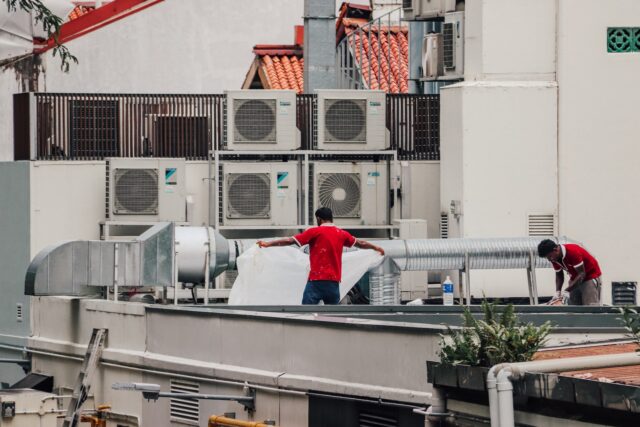
As the weather gets warmer and the humidity levels increase, many people turn on their AC units to reduce the humidity in their homes.
But does running your AC unit actually reduce humidity? In this blog post, we’ll take a look at the science behind AC units and humidity levels and see whether or not running your AC will actually help to lower humidity levels in your home.
Continue reading to learn the answer to the question, “does air conditioning reduce humidity?” and much more.
Click the following link if you’re looking for HVAC technicians that can provide you and your family with reliable AC services in Bella Vista.
The effects of humidity on your home and health
The effects of humidity on your home and health are often underrated. In reality, they can be quite significant.
For starters, high humidity levels can lead to the growth of mold and mildew, which can cause serious respiratory problems.
Additionally, humid air is often heavier and harder to breathe, which can exacerbate existing respiratory conditions.
Furthermore, humid conditions are often ideal for dust mites and other allergens, which can trigger allergies or asthma attacks. Finally, excessive humidity can cause wood to warp and walls to crack.
Clearly, it is important to keep humidity levels under control in order to protect your health and your home.
Does air conditioning reduce humidity from the air in your home?
Most people know that air conditioners cool the air, but did you know that they also remove humidity?
This process is essential for providing a comfortable indoor environment, and it works by using a simple law of physics. If hot air comes into contact with a cool surface, the water vapor in the air condenses into liquid form. This is why you often see droplets of water forming on the outside of a cold drink on a hot day.
In an air conditioner, this process takes place inside the evaporator coils. The warm, humid air from your home is drawn into the evaporator, where it comes into contact with the coils. As the air gets colder, the water vapor condenses and drips into a pan below. The now-dry air is then circulated back into your home, providing you with a cool and comfortable environment.
Now you know the answer to the question, “does air conditioning reduce humidity in your home?”.
Tips for using your AC unit to reduce humidity in your home
Here are some useful ways that homeowners can use their AC units to reduce the humidity levels in their homes:
- Set the thermostat at a low, comfortable temperature in order to maintain comfortable AC health. Doing this can also help prevent the formation of condensation on your AC unit.
- Use a dehumidifier in conjunction with your AC unit. Doing this will help to remove moisture from the air, making it easier for your AC unit to cool your home.
- Clean your AC unit regularly. This will ensure that it is functioning properly and removing moisture from the air effectively.
- Make sure that all of the vents in your home are open and unobstructed. Doing this helps the air to circulate efficiently, preventing the build-up of moisture.
- Run your AC unit for a few hours each day, even if you aren’t using it to cool your home.
Additional ways to reduce humidity in your home
If the humidity has got you down, there are a few easy ways to fight back and reclaim your home.
If you’re wondering, “does running an HVAC fan reduce humidity?” the answer is yes.
Fans are your friend; air movement will help to evaporate the moisture in the air, which will help manage the overall humidity levels. Ceiling fans are especially effective at regulating humidity.
Another basic tip to reduce humidity levels is to open the windows in your home. This will improve the airflow and help you enjoy comfortable breezes throughout the day.
You can also try out these useful tips if you want to learn how to reduce humidity in your home:
- Take shorter showers
- Don’t leave wet laundry lying around
- Keep houseplants to a minimum
- Use exhaust fans when cooking or showering
- Clean your humidifier regularly
- Insulate your home
- Seal cracks and gaps in your home’s envelope
What are some of the benefits of reducing humidity in your home?
While most people think of humidity as being caused by rain or other forms of water, it can also be present in homes.
High humidity levels can lead to a number of avoidable problems, including mold growth, musty odors, and rotting wood. In addition, high humidity can make it difficult to breathe, and it can aggravate allergies and asthma. As a result, it’s important to keep the humidity level in your home at a comfortable level.
Does running your AC reduce humidity? — Conclusion
So, there you have it. Your AC is reducing humidity in your home – this is a good thing!
If you’re still experiencing high levels of humidity even with your AC on, be sure to contact a reliable HVAC service today for assistance. They will be able to help you troubleshoot the issue and get your home back to its comfortable self in no time at all.








